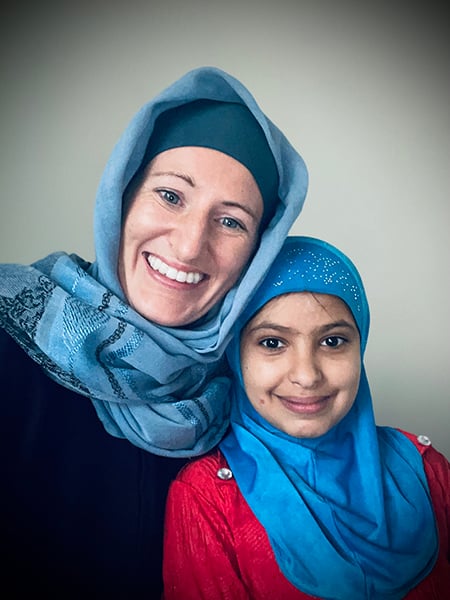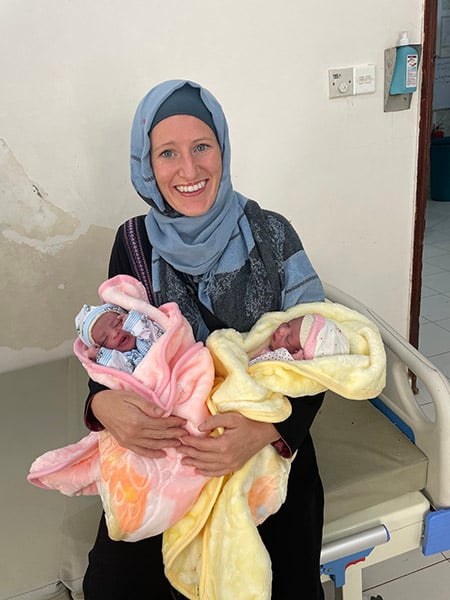My journey to this point in my career has been one of adventure and exploration, beginning with my move from Ireland to Aotearoa New Zealand in 2011. I spent over seven years in Hawke’s Bay providing complex midwifery care and serving as a flight midwife.
With plans for a one-year sabbatical, I travelled to Qatar. One year quickly turned into three as I found myself enjoying the experience, despite the culture shock. When I returned to Aotearoa New Zealand in 2020, I worked for a year on Auckland’s North Shore before joining the Maternal Fetal Medicine team, where I focused on providing abortion care and contraceptive services. Driven by a desire to contribute to global health, in June 2023, I applied to Médecins Sans Frontières (MSF). The recruitment process was rigorous, involving a three-hour interview and comprehensive preparations, including securing visas, permits, and necessary vaccinations, but finally, after months of anticipation, I was deployed to Yemen.
Yemen’s Complex Crisis
Since 2014, Yemen has been engulfed in civil war, leading to what the United Nations (UN) describes as the world’s worst humanitarian crisis. The UN estimates that 60% of the estimated 377,000 deaths in Yemen between 2015 and the beginning of 2022 were the result of indirect causes like food insecurity and lack of accessible health services. Two-thirds of the population, or 21.6 million Yemenis, remain in dire need of aid, including 11 million children. An estimated 4.5 million people have been displaced. Another 5 million are at risk of famine, and a cholera outbreak has affected over one million people. All sides of the conflict are reported to have violated human rights and international humanitarian law.1
Political tensions are evident daily. Anti-American and anti-Semitic broadcasts contribute to the general mistrust of foreigners. In June 2024, more than 30 humanitarian workers were detained on espionage accusations, further increasing tension and uncertainty.2
Adjusting to My New Environment
I was stationed in a very remote village as a midwifery manager within a multidisciplinary MSF team. Communication was a major challenge for me due to my limited Arabic ability, meaning I must rely on translators and bilingual colleagues to communicate with patients.
Our location, an eight-hour drive from the capital, Sana’a, significantly isolates us. While we can leave at any time, the reality of the journey is complicated.
Communication and basic services like internet, hot water and electricity are unreliable and at times, completely unavailable.
Every six weeks, we briefly return to Sana’a amidst the threat of missile attacks. These breaks offer rare opportunities to reconnect with family.
Living conditions are strictly controlled, with mandatory curfews and enforced safety protocols. Our diverse MSF team shares a communal living space and meals prepared locally, offering companionship and mutual support amid challenging conditions.

Amy Carter with a young girl
Facing the Realities of Birth and Death
The frequency of maternal deaths is a harsh reality here with many women receiving no antenatal care at all and are typically only seen for the first time during or after their labour.
The hospital, rebuilt by MSF in 2015 after being destroyed by bombing, offers limited but essential healthcare services. The women’s health department, responsible for both women’s health and paediatric cases, operates with minimal resources – two birthing beds, basic fetal monitoring equipment, and no pain relief or specialised neonatal care. Emergency care options are limited, and access to specialist referrals is restricted, as the nearest specialist service is one and a half hours away.
Caesarean sections are rare and preserved for life saving cases only due to requiring approval from the women’s husband, the ministry of health, and the hospital director, and when allowed, performed by general surgeons rather than obstetricians.
The ongoing cholera crisis means that infected women must deliver in an isolated tent outside the main building.
Women often arrive to the hospital too late, suffering severe postpartum haemorrhages after home births without prenatal care. One particularly distressing case I can recall involved a woman who, after her tenth childbirth, arrived with dangerously low haemoglobin and no signs of life. Despite our best efforts, we could not save her. Infant mortality is also alarmingly high.
Babies who do not survive birth are wrapped in a towel and taken home by the family. To date the families do not get a birth or death certificate for newborns unless requested from the ministry of health. This often results in women not knowing their own date of birth or the age of the older children.
The lack of autonomy and restrictions on women’s movement and reproductive choices have been particularly unsettling for me. Women must always be accompanied by a female caretaker and contraception and abortion services are forbidden. It is in this context of a highly charged political environment that I must balance the needs of women with the realities of my situation. Women sometimes come to me requesting contraception or abortion care, but I must be extremely careful. I cannot always trust the other hospital staff to keep it confidential and worry they would report it to the hospital director.

Amy Carter with two newborns
The MSF Experience
Working with MSF provides practical support, including flights, accommodation, a modest stipend, and necessary legal and psychological assistance. Regular breaks and counselling services help manage the intense emotional and physical demands.
Despite the challenges, working with MSF has been one of the most profound experiences of my career and I have been deeply impressed by my Yemeni colleagues. Their clinical skills and resilience in such resource-limited settings are extraordinary.
To midwives considering humanitarian work, I strongly recommend careful preparation for the emotional, ethical, and professional demands involved. Engage with experienced humanitarian midwives, strengthen your clinical skills, ensure robust personal support, and consider language training, particularly in Arabic or French.
References
- Yemen Crisis Explained [Internet] USA for UNHCR The UN Refugee Agency
- Yemen: Huthi authorities must immediately release arbitrarily detained staff from UN and civil society organizations [Internet] Amnesty International.







Leave a Reply